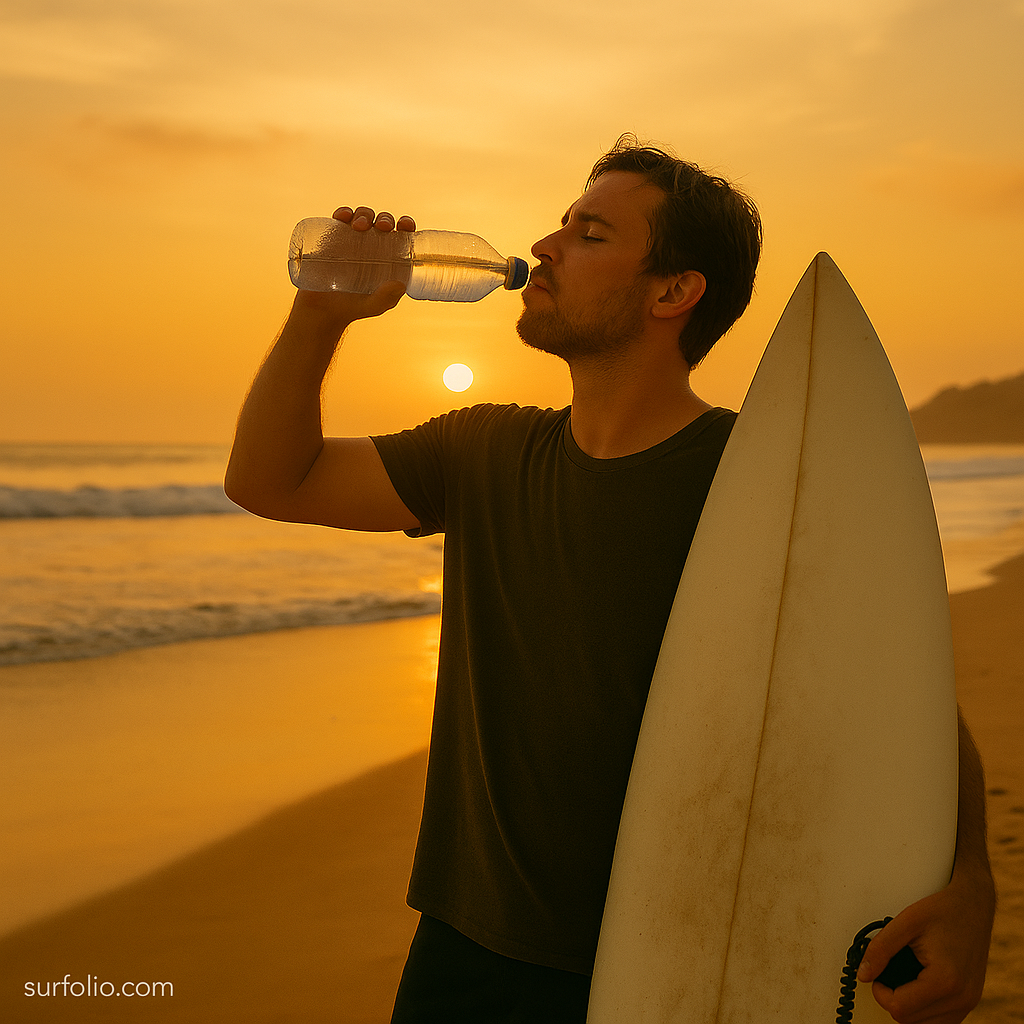
Surfing may look effortless from the beach, but few sports demand as much physical endurance. Paddling for hours, battling currents, and catching wave after wave can drain your body of fluids faster than you might realize. Add sun exposure, saltwater, and warm tropical conditions, and dehydration can sneak up before you even hit your first set.
For surfers, hydration isn’t just about comfort — it’s about performance, recovery, and safety. Here’s why staying hydrated matters, how surfing impacts your body’s fluid balance, and how to keep your stoke high and cramps low.
Why Hydration Is So Important for Surfers
When you surf, your body loses fluids through sweat and respiration — even if you don’t feel it in the water. Prolonged sessions increase this loss, especially under direct sun or while wearing a wetsuit.
Water makes up about 60% of your body, and even a 2% drop in hydration can affect muscle function and reaction time. That means your timing on takeoffs, your paddling strength, and even your ability to read waves can decline when you’re dehydrated.
Proper hydration helps to:
- Maintain paddle endurance and upper-body strength.
- Prevent muscle cramps during long sessions.
- Support focus and decision-making in the lineup.
- Regulate body temperature, especially in tropical or wetsuit-heavy environments.
- Aid post-surf recovery by flushing out lactic acid and toxins.
The Hidden Challenge: Salt and Sun
Surfers face unique hydration challenges compared to land athletes.
1. Saltwater Exposure
Saltwater dries your skin and lips and can accelerate dehydration when swallowed or absorbed in small amounts.
2. Sun and Wind
Sun exposure and wind both increase evaporation, pulling moisture from your skin and speeding fluid loss.
3. Wetsuits and Heat Retention
Wearing a full wetsuit traps body heat, increasing sweat output even in cold conditions. Ironically, you can dehydrate while surfing in chilly water.
4. Limited Access to Water
Unlike runners or cyclists, surfers can’t rehydrate mid-session. Once you’re in the lineup, you’re on your own until you return to shore.
Signs You’re Dehydrated in the Water
Because you’re surrounded by water, dehydration symptoms often go unnoticed. Pay attention to these telltale signs:
- Fatigue or sluggish paddling.
- Dull or slow reaction times.
- Muscle cramps (especially in the calves or forearms).
- Headaches or dizziness.
- Thirst or dry mouth after a short time.
- Dark yellow urine post-session.
If any of these show up mid-session, it’s a good idea to paddle in, rest, and rehydrate.
Pre-Surf Hydration Strategy
Hydration starts before you even wax your board. Aim to begin your session fully hydrated, not playing catch-up.
A few hours before surfing:
- Drink 16–20 ounces (0.5 L) of water.
- Add electrolytes or coconut water if you’ll be surfing longer than 90 minutes.
- Avoid excessive caffeine, which can act as a mild diuretic.
Right before paddling out:
- Sip another 8–10 ounces (0.25 L) of water.
- Eat hydrating foods like watermelon, oranges, or cucumber for natural water and minerals.
Hydrating During the Session (Indirectly)
You can’t exactly bring a bottle into the lineup, but you can reduce dehydration effects:
- Limit sun exposure between sets — duck underwater or wear a surf hat.
- Use a rash guard or wetsuit with UV protection to reduce moisture loss from sunburn.
- Don’t swallow saltwater — it worsens dehydration.
If you plan long sessions (3+ hours), take a brief break on shore every 90 minutes to drink water and stretch.
Post-Surf Rehydration
Once you hit the beach, replenishing lost fluids should be your top priority.
Follow this simple recovery plan:
- Drink 20–24 ounces (0.6–0.7 L) of water for every pound lost during your session.
- Add electrolytes — sodium, potassium, and magnesium — through a sports drink or supplement.
- Eat a balanced meal rich in fruits, vegetables, and lean protein to restore glycogen and minerals.
- Avoid alcohol immediately post-surf — it delays rehydration and muscle recovery.
Pro tip: Coconut water or electrolyte tablets (like Nuun or LMNT) work wonders after long tropical sessions.
The Role of Electrolytes
Plain water helps, but electrolytes make a difference when you’re sweating heavily or surfing in hot climates.
Key electrolytes to replace:
- Sodium: Retains water and prevents cramps.
- Potassium: Balances fluid and muscle function.
- Magnesium: Reduces fatigue and muscle tightness.
- Calcium: Supports nerve function and recovery.
Look for electrolyte blends with minimal added sugar, or make your own mix with a pinch of sea salt and a squeeze of lemon.
Hydration Myths Surfers Should Ignore
Myth #1: “You can’t get dehydrated while you’re in the ocean.”
Truth: You lose fluids through sweat and breathing — being surrounded by water doesn’t replace internal hydration.
Myth #2: “Only tropical surfers need to worry about hydration.”
Truth: Cold-water surfers wearing thick wetsuits can sweat just as much as tropical surfers — and may not realize it.
Myth #3: “Energy drinks hydrate.”
Truth: Most energy drinks contain caffeine and sugar, which dehydrate more than they help. Stick with electrolyte-based hydration.
Hydration Gear for Surfers
Consider adding these items to your surf routine:
- Reusable water bottle (stainless steel or BPA-free plastic).
- Electrolyte packets for easy post-session recovery.
- Hydration backpack for long hikes to remote breaks.
- Coconut water or isotonic drinks in your surf cooler.
Keep your water bottle ready in the car or on the sand — hydration starts the moment your feet leave the water.
Final Thoughts
Hydration is one of the simplest yet most overlooked aspects of surf performance. Whether you’re a weekend warrior or a daily charger, staying hydrated directly affects your strength, clarity, and longevity in the lineup.
Every drop of water you drink supports better endurance, sharper reactions, and faster recovery — helping you catch more waves and feel your best in and out of the ocean.
So next time you paddle out, remember: hydration is your invisible surf wax — it keeps everything flowing smoothly.
